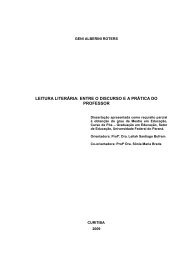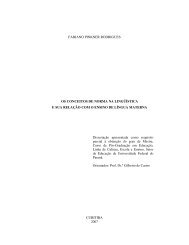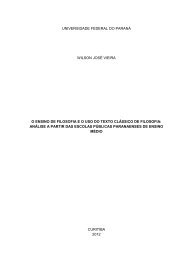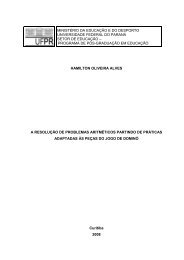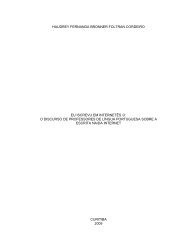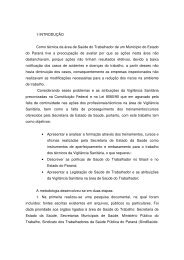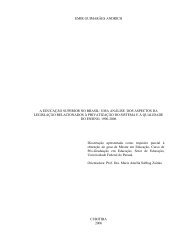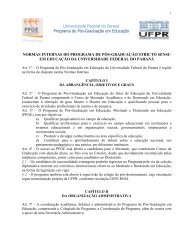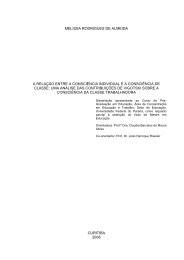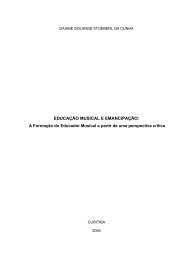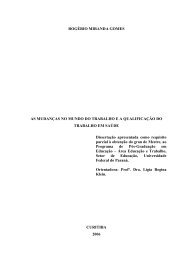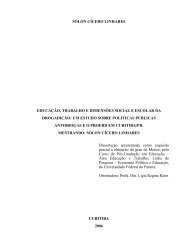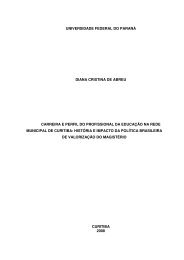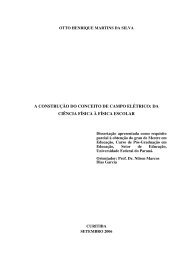Ronaldo Gazal Rocha - Programa de Pós-Graduação em Educação ...
Ronaldo Gazal Rocha - Programa de Pós-Graduação em Educação ...
Ronaldo Gazal Rocha - Programa de Pós-Graduação em Educação ...
You also want an ePaper? Increase the reach of your titles
YUMPU automatically turns print PDFs into web optimized ePapers that Google loves.
ABSTRACTDuring this study an <strong>em</strong>phasis was given to the economical and social-environmentaldynamics related to solid waste manag<strong>em</strong>ent in Curitiba, particularly related to theproject ‘ECOCIDADÃO’, with a special attention given to the educative processeswhich contribute to the construction of the waste collectors’ i<strong>de</strong>ntity. One consi<strong>de</strong>redthe changes in the labor world and the present forms of solid waste manag<strong>em</strong>ent inconsumption societies, together with proposals of creation of work associations orcooperatives to a growing number of waste collectors ‘exclu<strong>de</strong>d’ from the ‘formal’work market. The primary concern was aimed at the formative processes whichsubject the waste collectors and also, compl<strong>em</strong>entarily, the forms which theseprocesses articulate the including exclusion of these precarious workers in therecycling market. One att<strong>em</strong>pted to raise and un<strong>de</strong>rstand such mechanisms ofsubordination/overcoming their condition of exclu<strong>de</strong>d ones, and how their socialinsertion takes place in the <strong>de</strong>meritorious context of the sustainability discoursepractice. From the critical theory reference, the methodological options used thecategories from the historical materialism to study three of the impl<strong>em</strong>entedassociations/cooperatives consi<strong>de</strong>ring their political importance and/or age. After pretesting,s<strong>em</strong>i-structured interviews were ma<strong>de</strong> in or<strong>de</strong>r to raise the workers’ profiles,and as a way of un<strong>de</strong>rstanding the meaning of their practices and way of life.Documents were also analyzed as a means of raising the adopted focus and/orpossible pedagogical process ten<strong>de</strong>ncies to which the researchedindividuals/institutions are subjected to. Certain social phenomena were related tothe research questions through the method categories: Totality, Contradiction, Praxisand Heg<strong>em</strong>ony. In or<strong>de</strong>r to go further in the study, we <strong>de</strong>limited two investigationpaths which allowed us to make relations evi<strong>de</strong>nt, as well as to <strong>de</strong>fine concepts,explain processes, organize and structure the research itself. At the end of the work itwas possible to note that:1) the historical issue involving garbage reveals thesignificant growing importance of recycling with the active participation of workerswho do not have a formal job; 2) the high consumption puts itself as a discretionaryel<strong>em</strong>ent of the social, environmental and economical dynamics; 3)the increase ofgoods production, waste and goods programmed obsolescence are main aspects inthe manag<strong>em</strong>ent of waste which are <strong>de</strong>finitely connected to the recycling economicalcircuit; 4) the ‘solutions’ for the growing number of waste collectors in Curitibasearched for alternative forms of a higher socio-economical participation of thosewho live from garbage; 5) the work in the warehouses present specificities which donot allow us to evi<strong>de</strong>nce the collective work as an incorporated activity due toeconomical and political issues; 6) the new forms of disciplining the work force are inaccordance with the new <strong>de</strong>mands imposed by the flexible accumulation regimewhich extend to the work processes and generated goods, to the markets, and to thenew established consumption patterns. In general, the associations/cooperativesmay be an option to guarantee income and value the worker who <strong>de</strong>pends on wastecollection for surviving, but are still not enough to guarantee a structural change ofthe conditions to which the recycling material collectors are subjected to.xiii



